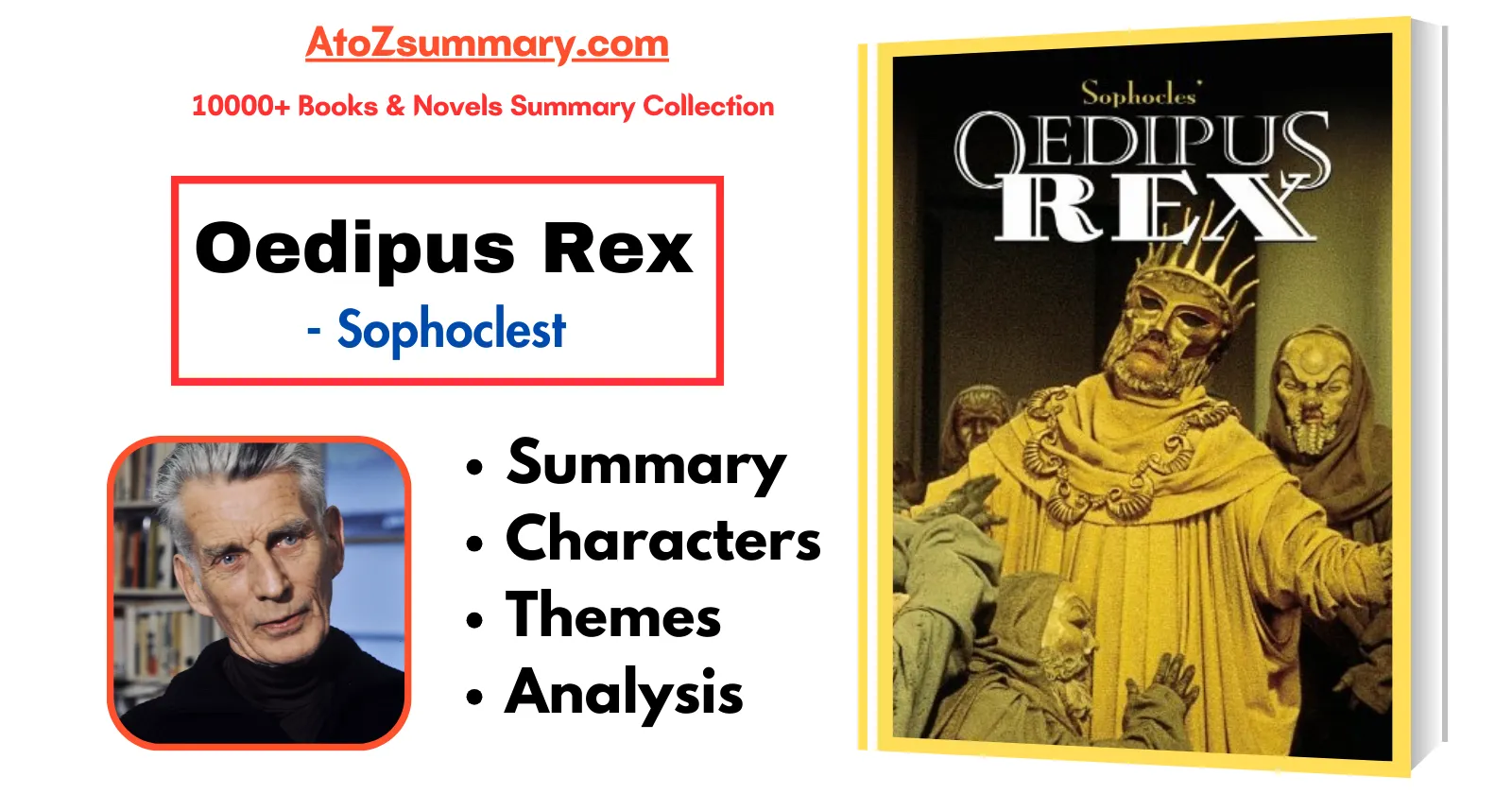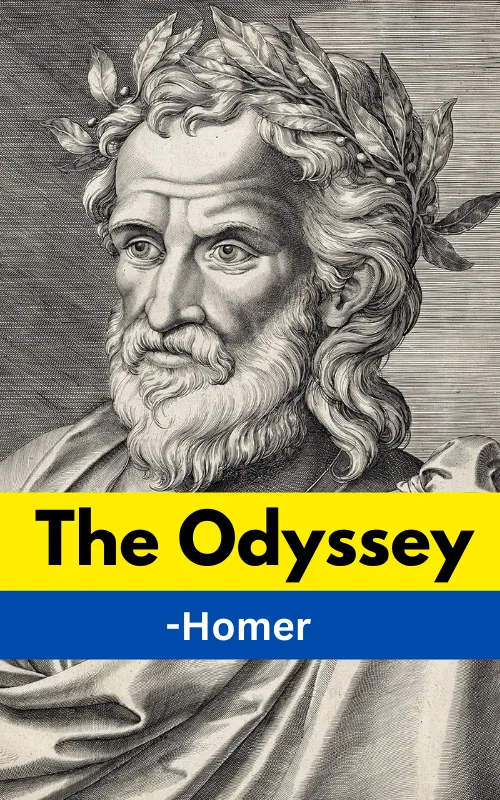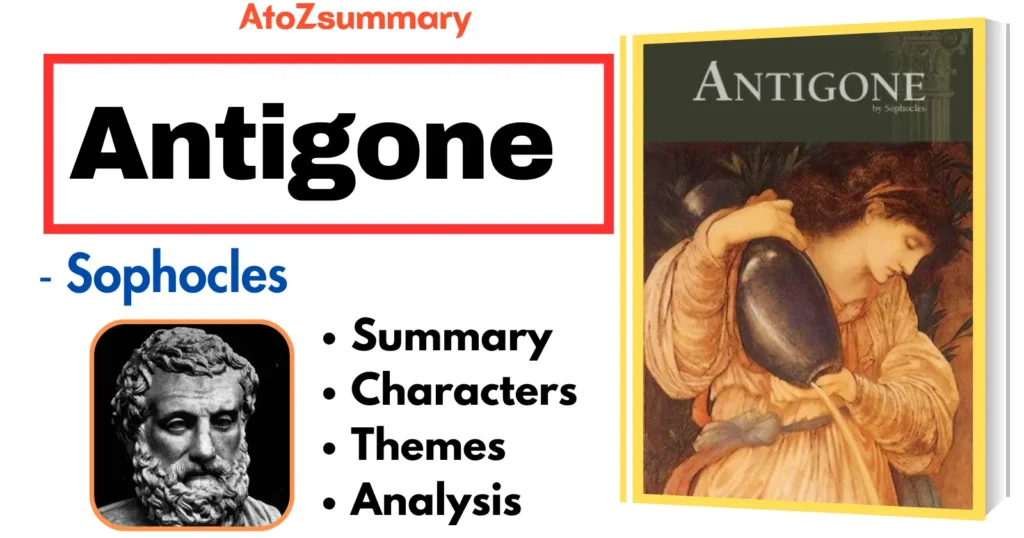Analysis
Oedipus Rex is a classic Greek tragedy written by Sophocles. The play revolves around Oedipus, the king of Thebes, who is determined to save his city from a plague. As he investigates the cause, he discovers a horrifying truth – he unknowingly killed his father and married his mother, fulfilling a prophecy he tried to escape.
| Author | Sophocles |
| Genre | Greek Tragedy |
| Original Title | Oedipus Tyrannus |
| English Title | Oedipus Rex |
| Date of First Performance | Around 429 BC |
| Setting | Thebes, Greece |
| Main Characters | Oedipus, Jocasta, Tiresias, Creon |
| Themes | Fate, free will, hubris, self-discovery |
| Style | Tragic, suspenseful, poetic |
Characters
The characters of “The Power of One” by are:
- Oedipus: The main character and king of Thebes. Oedipus is determined to solve the mystery of the city’s plague and discovers unsettling truths about his own past.
- Jocasta: Oedipus’s wife and mother (unbeknownst to him). She plays a crucial role in the revelation of Oedipus’s identity.
- Creon: Jocasta’s brother and Oedipus’s brother-in-law. Creon tries to help Oedipus throughout the play and later becomes the king.
- Teiresias: A blind prophet who reluctantly reveals the disturbing truth to Oedipus.
- Chorus: A group of Theban citizens who provide commentary on the unfolding events and express the collective voice of the people.
- Messenger: A messenger brings news about Oedipus’s origin and attempts to comfort him in difficult times.
- Shepherd: A witness to the events surrounding Oedipus’s infancy, the Shepherd reveals crucial information about Oedipus’s past.
- Laius: Oedipus’s biological father and former king of Thebes. His actions set the tragic events of the play in motion.
Themes
The themes of “Oedipus Rex” by Sophocles are:
- Fate and Free Will: Oedipus tries to escape his predicted destiny but ends up fulfilling it, highlighting the struggle between fate and free will.
- Blindness and Ignorance: Oedipus is blind to the truth throughout the play, symbolizing the theme of human ignorance and the consequences of being unaware.
- Knowledge and Wisdom: The play explores the consequences of seeking knowledge and the thin line between wisdom and arrogance.
- Hubris (Excessive Pride): Oedipus’s pride leads to his downfall, illustrating the dangers of excessive pride and the punishment that often accompanies it.
- Justice and Punishment: The play examines the concept of justice as Oedipus faces the consequences of his actions and seeks redemption.
- The Tragic Hero: Oedipus embodies the classic tragic hero, facing a downfall due to a tragic flaw, evoking pity and fear in the audience.
- The Power of Prophecy: The play delves into the power and inevitability of prophecies, raising questions about whether one can escape their predetermined fate.
- The Search for Identity: Oedipus’s journey involves a search for his true identity, emphasizing the importance of self-discovery and the impact of one’s origins on their life.
Watch Full Play Summary of “Oedipus Rex”
Oedipus Rex Summary
Thebes is afflicted by a disease that renders its fields and women infertile at the beginning of the play. Thebes’ king Oedipus has dispatched his brother-in-law Creon to Apollo’s home to consult the oracle about how to put an end to the epidemic. When Creon returns, the good news is that Thebes will be spared from the plague if the killer of the previous king, Laius, is apprehended. (Laius was Jocasta’s spouse before her marriage to Oedipus). When Oedipus hears this, he makes a vow to track out the killer and exile him. The blind prophet Teiresias should be consulted, advises the Chorus, who stands in for the Theban populace. They are informed by Oedipus that Teiresias has already been sent for.
As Teiresias shows up, he appears hesitant to respond to Oedipus’s inquiries and gives the impression that he is not interested in learning the answers. After Oedipus threatens to kill him, Teiresias ultimately informs him that Oedipus is the murderer and that his marriage is an immoral one. Oedipus interprets this as an insult and assumes that Teiresias was hired by Creon to make these statements. Enraged, Oedipus dismisses him, and Teiresias leaves, reiterating that the man who killed Laius’s father and is the spouse of his mother is standing in front of him; he comes seeing but will become blind.
As Creon walks in, he asks others in his immediate vicinity if it’s true that Oedipus falsely accused him. As the Chorus tries to arbitrate, Oedipus shows up and accuses Creon of betraying his country. Oedipus reluctantly gives in to the pleas of Jocasta and the Chorus and lets Creon leave. When Jocasta asks Oedipus why he is sad, he explains the prophecy of Teiresias to her. Jocasta consoles him by stating that she has evidence to support the falsehoods of prophets and oracles. Laius and Jocasta sent their young boy to a shepherd to be left outside on a mountainside to die with a pin through its ankles after an oracle long ago informed them that their son would murder him.
However, Laius’s death at the hands of bandits, not his son, proved the oracle to be false. However, Oedipus finds something troubling in her account; she mentions that Laius was slain at a crossroads, which makes him think of an earlier episode in which he killed a stranger at a crossroads. When he asks her to describe Laius, her account corresponds with what he remembers. Jocasta, however, informs him that Laius was murdered by five thieves, according to the herdsman who was the only witness to the incident. Oedipus calls upon this observer.
Jocasta questions Oedipus about why he appears to be so disturbed while they wait for the stranger to come. Oedipus shares with her his prior experiences. He was informed that he was not his father’s son by a man he met when he was young. When he questioned his parents about it, they refuted it. He was still concerned by it, and in the end, he sought the advice of an oracle to find out his true ancestry. Then the oracle said that he would wed his mother and slay his father. Oedipus was so terrified by this prophecy that he fled his homeland and never came back.
At a crossroads on his travels, he came across a pretentious guy, whom he murdered after being insulted. Oedipus fears that Laius may have been the stranger he killed. If this is true, Oedipus will be permanently exiled from Corinth, his homeland, as well as Thebes, the place where he vowed to exact revenge on Laius’s killer. Oedipus is cleared if the eyewitness claims that the thieves killed Laius. He asks God to spare him the shame and exile caused by the witness. Jocasta and Oedipus enter the palace to await his arrival.
Jocasta leaves the palace once more and heads to the sacred shrines to offer prayers for Oedipus. Word has reached us from Corinth that Oedipus’s father, Polybus, has passed away. Joyful that she now has more evidence of the oracles’ futility, Jocasta sends for Oedipus. Oedipus expresses his happiness but then says he is still terrified of the oracle’s remaining prophecy, which is that he will wed his mother. The message reassures him that he doesn’t have to be afraid to approach Corinth because neither Polybius nor Merope are truly his parents. Oedipus is astounded and asks him how he learned this.
The messenger responds, saying that years before, he was given a kid by a man, who later handed him to the king and queen of Corinth. This baby would eventually become Oedipus the King. The fact that Oedipus’s ankles were injured—the infant’s feet having been punctured through them—testifies to the veracity of his story. When Oedipus asks the messenger who handed him the infant, he says it was one of Laius’s attendants.
To locate this servant, Oedipus dispatches his soldiers. The envoy says Jocasta ought to be able to assist in identifying the servant and revealing the real account of Oedipus’s birth. Jocasta, realizing the awful reality at that moment, asks Oedipus to stop his research. In response, Oedipus declares that he will fulfill his pledge to solve this enigma. Jocasta disappears into the palace.
Once more, Oedipus vows that he will discover this mystery, regardless of how repulsive the solution is. Sensing that a terrible event is going to happen, the Chorus joins Jocasta in pleading for the mystery to remain unsolved. An elderly shepherd who is reluctant to respond to Oedipus’s queries leads Oedipus’s troops. But at last, he confesses the truth to Oedipus. In reality, he gave birth to a boy who was the son of Laius, the same son that Laius and Jocasta had abandoned to perish according to the oracle’s prophesy on a hillside.
At last, the truth is revealed; Oedipus leaves inside the palace, distraught. According to a messenger, he went looking for Jocasta to kill her after grabbing a sword. But when he walks into her room, he discovers that she has hung herself. He rips his eyes out and removes the gold brooches off her clothing. Once more, he makes an appearance on stage, his eyes now blinded by blood. He wails that he will never see again since he has witnessed and committed such heinous acts. He begs for his death from the Chorus.
After hearing the whole tale, Creon comes in and asks Oedipus to come inside where he won’t be seen. When Oedipus pleads for permission to leave the city, Creon responds that he must first speak with Apollo. Creon concurs with Oedipus when he informs him that the sentence he decreed for Laius’s murderer is exile. But before he departs for good, Oedipus begs Creon to look after his daughters and requests to see them. After that, Oedipus is brought away, and Creon and the females return to the palace. Only the Chorus bemoans Oedipus’s terrible destiny and his cursed ancestry.
FAQs
What is the story of Oedipus Rex?
A king unknowingly murders his father and marries his mother, fulfilling a prophecy and bringing a plague upon his city.
What is the message of Oedipus Rex?
The message of Oedipus Rex is that pride and ignorance can lead to a tragic downfall.
Why is Oedipus Rex so tragic?
Oedipus Rex is so tragic because Oedipus unwittingly fulfills a prophecy that he will kill his father and marry his mother, leading to his downfall and immense suffering.
Why did Oedipus marry his mother?
Oedipus married his mother Jocasta because he was unaware of their true relationship.
What was Oedipus tragic flaw?
Oedipus’ tragic flaw was his excessive pride and self-assurance that led him to reject the prophecies and make decisions that ultimately brought about his downfall.
Why did Oedipus blind himself?
Consumed by guilt and horror, Oedipus blinded himself to escape the unbearable truth of his actions.
What does Oedipus regret doing?
Oedipus regrets killing his father and marrying his mother.
What curse did Oedipus place on his sons?
Enraged by their betrayal, Oedipus cursed his sons to die at each other’s hands.
Did Oedipus know he was adopted?
No, Oedipus did not know he was adopted until later in the play. He was raised by the king and queen of Corinth as their own son.
What does Oedipus do when he finds out he accidentally killed his own father?
Consumed by grief and horror, Oedipus blinds himself in despair, unable to bear the weight of his unintentional crime.
Who decided to have Oedipus killed as an infant?
Laius, King of Thebes, consulted an oracle who prophesied that his son would kill him. Fearing for his life, Laius ordered his newborn son, Oedipus, to be killed.
Why does Oedipus never go back to see the people who raised him?
Oedipus never returns to his adoptive parents in Corinth because he fears that the prophecy of the oracle, which predicts he will kill his father and marry his mother, will come true if he stays with them.
Where did the father of Oedipus leave his infant son because of the curse?
Fearing the curse of fate, Oedipus’ father left him on Mount Cithaeron’s desolate gate.








![The Catcher In The Rye Summary, Themes & Characters [by J. D. Salinger] The Catcher In The Rye Summary, Themes & Characters [by J. D. Salinger]](https://atozsummary.com/wp-content/uploads/2023/06/The-Catcher-In-The-Rye-Summary-Themes-Characters-by-J.-D.-Salinger.webp)


